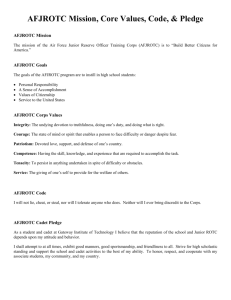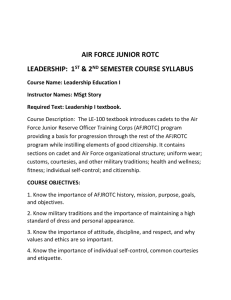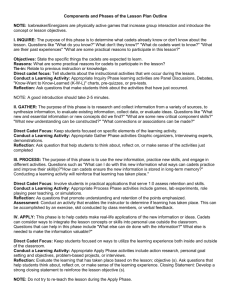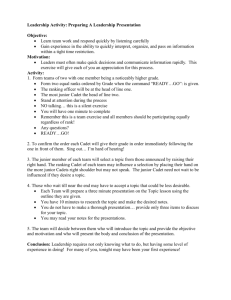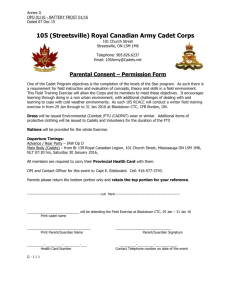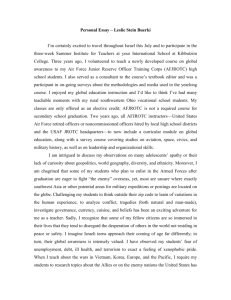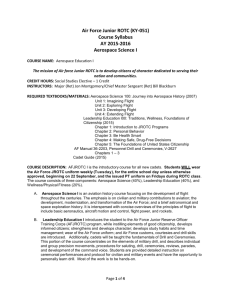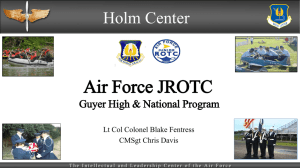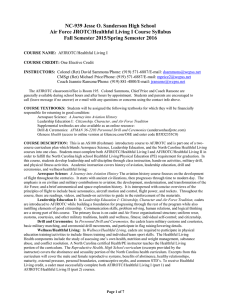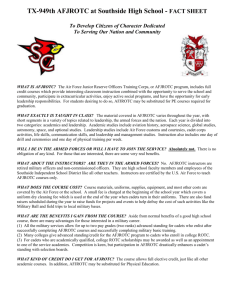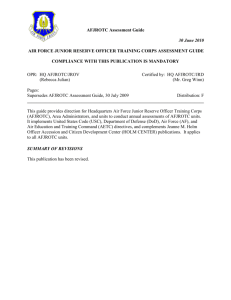Aerospace Science I - Boerne AFJROTC's reminders
advertisement
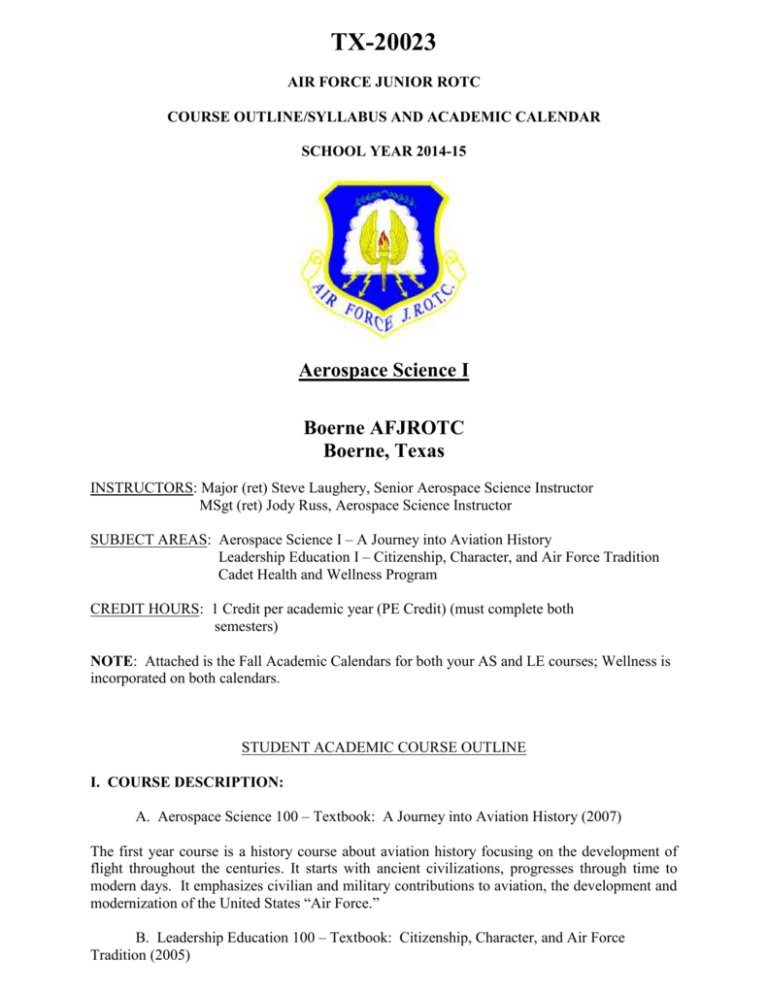
TX-20023 AIR FORCE JUNIOR ROTC COURSE OUTLINE/SYLLABUS AND ACADEMIC CALENDAR SCHOOL YEAR 2014-15 Aerospace Science I Boerne AFJROTC Boerne, Texas INSTRUCTORS: Major (ret) Steve Laughery, Senior Aerospace Science Instructor MSgt (ret) Jody Russ, Aerospace Science Instructor SUBJECT AREAS: Aerospace Science I – A Journey into Aviation History Leadership Education I – Citizenship, Character, and Air Force Tradition Cadet Health and Wellness Program CREDIT HOURS: 1 Credit per academic year (PE Credit) (must complete both semesters) NOTE: Attached is the Fall Academic Calendars for both your AS and LE courses; Wellness is incorporated on both calendars. STUDENT ACADEMIC COURSE OUTLINE I. COURSE DESCRIPTION: A. Aerospace Science 100 – Textbook: A Journey into Aviation History (2007) The first year course is a history course about aviation history focusing on the development of flight throughout the centuries. It starts with ancient civilizations, progresses through time to modern days. It emphasizes civilian and military contributions to aviation, the development and modernization of the United States “Air Force.” B. Leadership Education 100 – Textbook: Citizenship, Character, and Air Force Tradition (2005) The LE-100 textbook introduces cadets to the Air Force Junior Reserve Officer Training Corps (AFJROTC) program providing a basis for progression through the rest of the AFJROTC program while instilling elements of good citizenship. It contains sections on cadet and Air Force organizational structure; uniform wear; customs, courtesies, and other military traditions; health and wellness; fitness; individual self-control; and citizenship. Additionally, cadets will be taught the fundamentals of Drill and Ceremonies. This portion of the course concentrates on the elements of military drill, and describes individual and group precision movements, procedures for saluting, drill, ceremonies, reviews, parades, and development of the command voice. Students are provided detailed instruction on ceremonial performances and protocol for civilian and military events and have the opportunity to personally learn drill. Most of the work is to be hands-on. C. Cadet Health and Wellness Program Wellness is an official part of the Air Force Junior ROTC program. It is an exercise program focused upon individual base line improvements with the goal of achieving a national standard as calculated with age and gender. Wellness is instrumental in developing citizens of character dedicated to serving our nation and communities. The program is provided as a tool to help you develop individualized training programs for your cadets. Cadets will be given the opportunity to put into practice the wellness concepts that are taught in Leadership Education I. Instructors are free to include other activities cadets enjoy such as team sports in order to keep the Wellness Program fun and motivating. The Wellness Program is a 36-week program modifiable to meet individual goals. Personal improvement will be rewarded. The 36-week program is comprised of 19 exercises which can be conducted with minimal space and with minimal climate dependency (e.g. the 1-mile run). The exercises develop all muscle groups and provide sufficient anaerobic and aerobic intensity. They require no equipment and use only body weight and common objects (e.g. chairs). Cadets will wear the issued PT uniform on Fridays. II. COURSE OBJECTIVES A. Aerospace Science 100 – A Journey into Aviation History The students will: 1. 2. 3. 4. Know the historical facts and impacts of the early attempts to fly Know the major historical contributors to the development of flight Know the contributions of the U.S. Air Force to modern aviation history Know the key events of space exploration history B. Leadership Education 100 – Citizenship, Character, and Air Force Tradition The students will: 1. Know the importance of AFJROTC history, mission, purpose, goals, and objectives. 2. Know military traditions and the importance of maintaining a high standard of dress and personal appearance. 3. Know the importance of attitude, discipline, and respect, and why values and ethics are so important. 4. Know the importance of individual self-control, common courtesies and etiquette. 5. Know that an effective stress management program improves the quality of life. 6. Know why courtesies are rendered to the United States flag and the National Anthem. 7. Know why it is important to be a good democratic citizen and to be familiar with the different forms of governments. 8. Know the importance of keeping yourself well and helping others stay well. C. Cadet Health and Wellness Program The students will: 1. Create a personalized training routine based on their baseline, age, and gender and participate in the Cadet Fitness Program. . 2. Strive to complete the number of repetitions indicated in their personal workout plan. 3. Perform all exercises at home a minimum of 3 times a week in order to fulfill their training program and make adequate progress. Identify areas of improvement. 4. Participate fully and observe safety precautions including getting hydrated before starting an exercise routine. III. TECHNIQUES AND METHODS OF INSTRUCTION A. C. E. G. I. Lecture/Discussion Text assignments Oral/written presentations Audiovisual/Computer materials Classroom Performance System B. D. F. H. Guided discussion Practical exercises Uniform inspections Special Considerations 1. Students requiring assistance with English are a special concern. These students will receive teacher support in order to achieve desired levels of performance. 2. There are a variety of ESL strategies that will be used to assist those students with special needs. These range from personal attention with assignments to the use of bi-lingual students to assist the student with daily work and evaluation instruments. IV. STUDENT EXPECTATIONS AND CONDUCT: 1. In addition to the rules of Champion and Boerne High Schools, each student is expected to follow the guidelines outlined in the TX-20023 AFJROTC Cadet Guide. 2. On-time class attendance is expected of each student. 3. Students are expected to come to class with all course materials, something to write on, and something to write with. 4. No food, drink, or gum is permitted in the classroom. GRADING SCALE USED IN BOERNE INDEPENDENT SCHOOL DISTRICT Grade A B C F Percentage Required 90% and above 80%-89% 70%-79% 69% and below GRADING POLICY BREAKDOWN BY CATEGORY IN GRADEBOOK EXAMS/PROJECTS: UNIFORM WEAR QUIZZES: HOMEWORK/WELLNESS: 25% 30% 30% 15% V. EVALUATION: The final grade for this course of instruction will be based on the student's performance in the following areas. Assessments (Including weekly exams/semester exams) Uniform Wear Homework Wellness Program Extra Credit Grading Notes: A. Exams/Projects All assessment grades are based on a 0-100 point scale and include 9-weeks exams, semester exams at the end of each semester, projects, and written assignments. B: Uniform Inspections Wear of the AFJROTC Cadet Uniform is MANDATORY once a week on your first LE day to all classes. Improper or disrespectful wear of the uniform and/or not wearing the uniform to all classes on uniform wear day will result in an inspection score of zero. Guidelines for the wear of the uniform can be found in the TX-20023 AFJROTC Cadet Guide. Weekly uniform inspections will be conducted with 100 points possible for each inspection. The inspection will be conducted using the standards listed in AFI 36-2903 and AFROTCI 36-2001. These standards are listed in the TX-20023 AFJROTC Cadet Guide. Students are expected to be in uniform the first day back to class if they missed a required uniform wear day (refer to the TX-20023 AFJROTC Cadet Guide for further guidance). HABITUAL NON-WEAR OF THE UNIFORM AND FAILURE TO MAINTAIN STANDARDS WILL RESULT IN A FAILING GRADE AND DISMISSAL FROM THE PROGRAM. C. Quizzes All quiz grades are based on a 0-100 point scale and include lessons from the Aerospace Science and Leadership Education Textbooks, lesson worksheets, stationary drill and marching. Quizzes are taken using the CPS remotes. Practice quizzes for the AS portion of the program can be accessed through the academic page of the unit’s website, WWW.TX20023.com. All failed quizzes may be retaken within one week of the failure. It is the cadet’s responsibility to obtain missed questions from the instructor. Retakes will consist of oral examination of only the questions that were missed. A successful retake will result in a grade of 70. If a cadet misses a quiz it is their responsibility to approach the instructor the next AFJROTC class to make it up; failure to do so will result in a “0” for the quiz. D. Homework/Wellness All homework assignments are outlined on the cadet’s academic calendar. It is the cadet’s responsibility to find out what assignments were missed due to class absence. Cadets must turn in any missed assignments by their first AFJROTC class upon returning from an absence. Wellness Training will normally be conducted on Fridays. Each cadet’s grade will be based on their wearing issued training clothing, having a water bottle, and participation. Cadets that do not participate will receive a “0” in the Homework/Wellness category in Gradebook. Only cadets with a medical excuse are exempt from participation. E. Extra Credit Cadets may earn extra credit by doing the Lesson Review question at the end of each lesson; by presenting current event articles to their flight that pertain to the subject matter; and for other projects that have prior instructor approval. F. Miscellaneous Guidance CADET DISTANCE LEARNING COURSES: Cadets can complete six courses through the Army Cadet Command. Cadets completing courses can present their certificates to the instructors and receive a grade pass for any missed homework assignments or failed quizzes. These courses can be accessed at www.jrotcdl.com. COMMUNITY SERVICE: Cadets will have multiple opportunities to perform Air Force JROTC sponsored community service during each semester. Community service is voluntary, but to achieve your full potential in our program community service is highly recommended. CURRICULUM IN ACTION TRIPS (CIA)/FIELD TRIPS: Throughout the semester, the cadets will have opportunities to participate in school-sponsored activities that serve as an extension of the AFJROTC curriculum. These trips may include NASA, local military bases, Mo-Ranch, etc. Cadets must be in good academic and disciplinary standing to participate. CLASS BEHAVIOR: The nature of the AFJROTC mission, as well as its high visibility within the school and community, requires it members to adhere to higher standards than might be found among the student population. Inappropriate behavior, in or out of uniform, is prohibited while in participating in AFJROTC. This behavior includes, but is not limited to, consuming alcohol, drug abuse, tobacco use, horseplay, public displays of affection, fighting, disparaging remarks, insubordination, disrespect, verbal threats and physical attacks. CELL PHONE/ELECTRONIC DEVICE POLICY: Cell phone/electronic device policy is in accordance with BISD instructions. Cell phones must remain turned off and out of sight during your AFJROTC period. Students who use telecommunication devices without prior permission will have the device confiscated. Parents may pick up the confiscated device from the assistant principal’s office for a fee.

